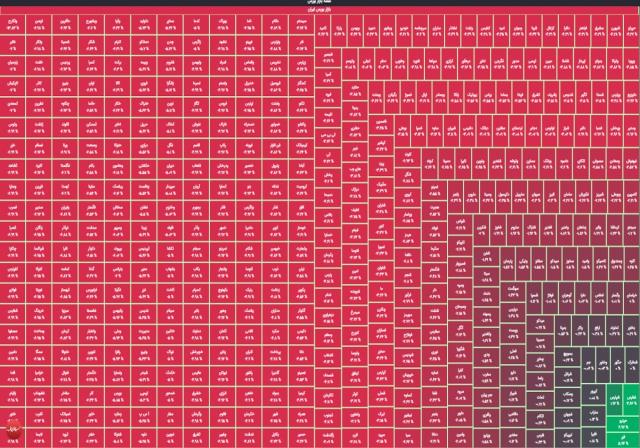As celebrations from supporters of the Islamic Republic echo through the streets following Saturday’s missile attack on Israel, a pervasive sense of anxiety grips the broader Iranian populace, concerned about the economic fallout and the looming threat of a full-scale war.
The response was immediate and palpable when Iran declared its deployment of drones and missiles, with the projectiles expected to reach Israeli territory shortly thereafter. In the wake of this announcement, panicked citizens formed extensive queues at gas stations across several cities, signaling a collective fear of impending conflict.
Iran hijacked a ship, kidnapped its Filipino crew…. and did this to its stock market and currency.
— Eylon Levy (@EylonALevy) April 13, 2024
Piracy doesn’t pay. pic.twitter.com/3osnHNFSlw
Amid these scenes of distress, small clusters of government loyalists, numbering from tens to a few hundreds, initiated "celebrations" in various urban locales. However, the broader public sentiment was one of apprehension, rather than triumph.
This anxiety was mirrored in the economic sphere, where the Iranian rial plummeted precipitously against the dollar, reaching lows of over 700,000 even before the missiles had approached Israeli airspace. In an attempt to stabilize the currency, Tehran authorities reportedly took drastic measures, including injecting dollars into the market and imposing severe threats of closure on exchange bureaus and online traders. These interventions led to a partial recovery of the rial to about 660,000 to the dollar by Sunday, a slight improvement from its nadir.
Due to the tension btwn Iran and #Israel, #Iran stock market is all RED! #USA Dollar rate is once again around 650000 Iran Rials for 1$. pic.twitter.com/DuBiOGTBDo
— BenSabti (@BeniSabti) April 13, 2024
The Tehran Stock Exchange also experienced volatility, dropping by approximately 0.5 percent, or 11,000 points, by Sunday’s close. It recouped about half of those losses by midday Monday.
The Iranian government's response extended to the realm of information control, as at least two journalists and two newspapers were prosecuted for allegedly threatening the public's psychological security by expressing concerns about the political and economic repercussions of the escalation. The government has also encouraged citizens to report any pro-Israel sentiments shared on social media.
The general populace remains largely observant and cautious, awaiting further developments. According to Saman, a 47-year-old retailer in Tehran, "There is a lack of patriotism and national pride for the attack, which was more extensive than anticipated. Most people I know expected any 'hard revenge' to be confined to a symbolic strike, perhaps targeting an Israeli embassy in a nearby country like Georgia, Armenia, or Azerbaijan."
Tel Aviv right now. Those Tel Aviv destroying missiles and drones Iran crippled its economy over 40 years to build were certainly a great investment. pic.twitter.com/vZgbD5PoOy
— Saul Sadka (@Saul_Sadka) April 14, 2024
Economic concerns dominate public discourse, with citizens particularly worried about the impact of the crisis on foreign exchange rates, the cost of housing, and general inflation, which could exacerbate the already challenging living conditions.
Adding to these voices are statements from labor and teachers' unions, which highlight the economic strain on ordinary Iranians caused by the government's military expenditures. The Coordination Council of Teachers Associations issued a statement emphasizing that the real victims of the attack are the Iranian people, burdened by the costs of the missile and drone arsenal and its broader consequences.
Moreover, the Independent Iranian Workers Union described the strike as reckless "adventurism" and warned of catastrophic consequences if the conflict escalates further.
As I explained to @bbclysedoucet, many people in Iran are worried about the economic consequences of last night's attack on Israel. With official inflation rate standing at 40.7%, any further devaluation of the Iranian currency, Rial, could exacerbate the cost of living crisis. pic.twitter.com/gVO66LRymh
— Behrang Tajdin (@Behrang) April 14, 2024
A distinct faction within Iran, consisting of those favoring the restoration of the monarchy, has openly supported Israel on social media. Their messages and graffiti, both in Persian and English, express solidarity with Israel and call for regime change in Iran should Israel retaliate.
Meanwhile, the reformist opposition has treaded carefully, largely avoiding outright condemnation of the strike while expressing concerns about further escalation. Mohammad Ali Abtahi, a prominent reformist and former presidential aide, acknowledged the attack as a defensive response to Israeli actions but advocated for de-escalation and peace.
In the wake of heightened geopolitical tensions, the already battered Iranian currency, rial, has been thrust into a whirlwind of volatility, with the dollar breaching the 700,000 rials mark over the weekend.https://t.co/SZKzwO7cJK
— Iran International English (@IranIntl_En) April 15, 2024
In summary, while some segments of the Iranian government and its supporters hail the missile strike as a bold defense against Israeli aggression, the wider Iranian community remains deeply concerned about the potential for an escalating conflict and its devastating economic and human consequences.


